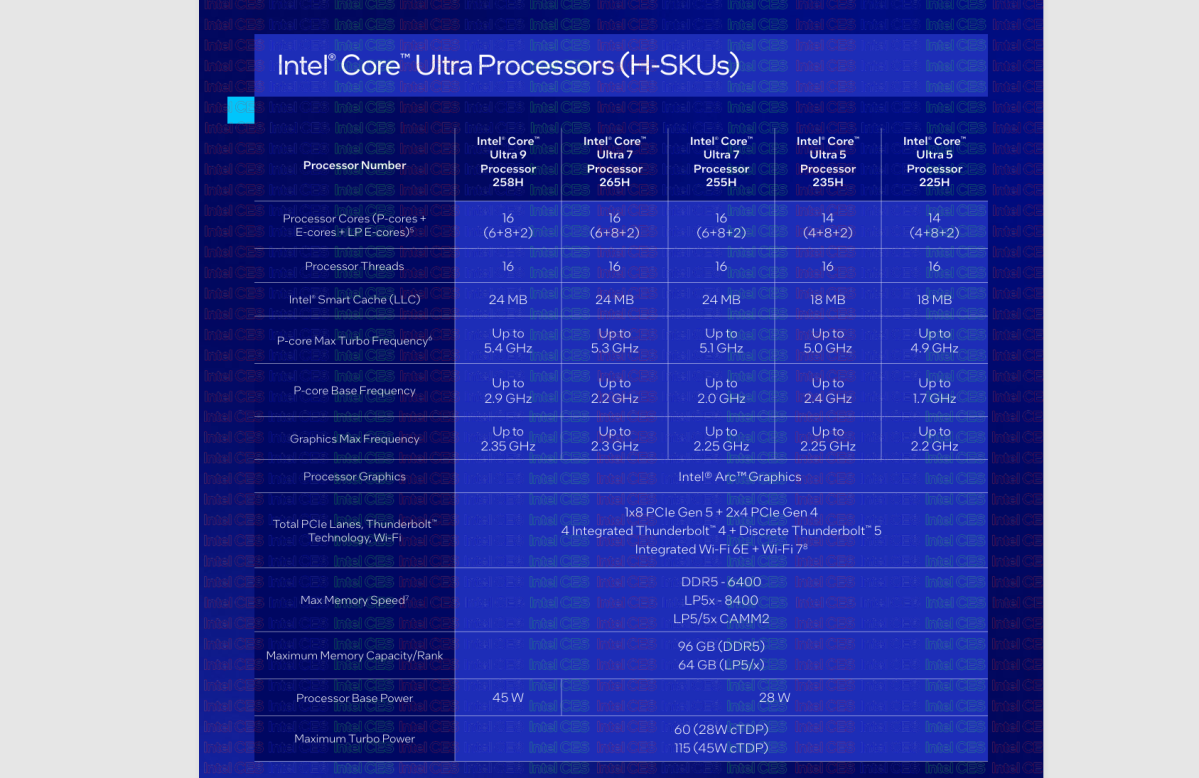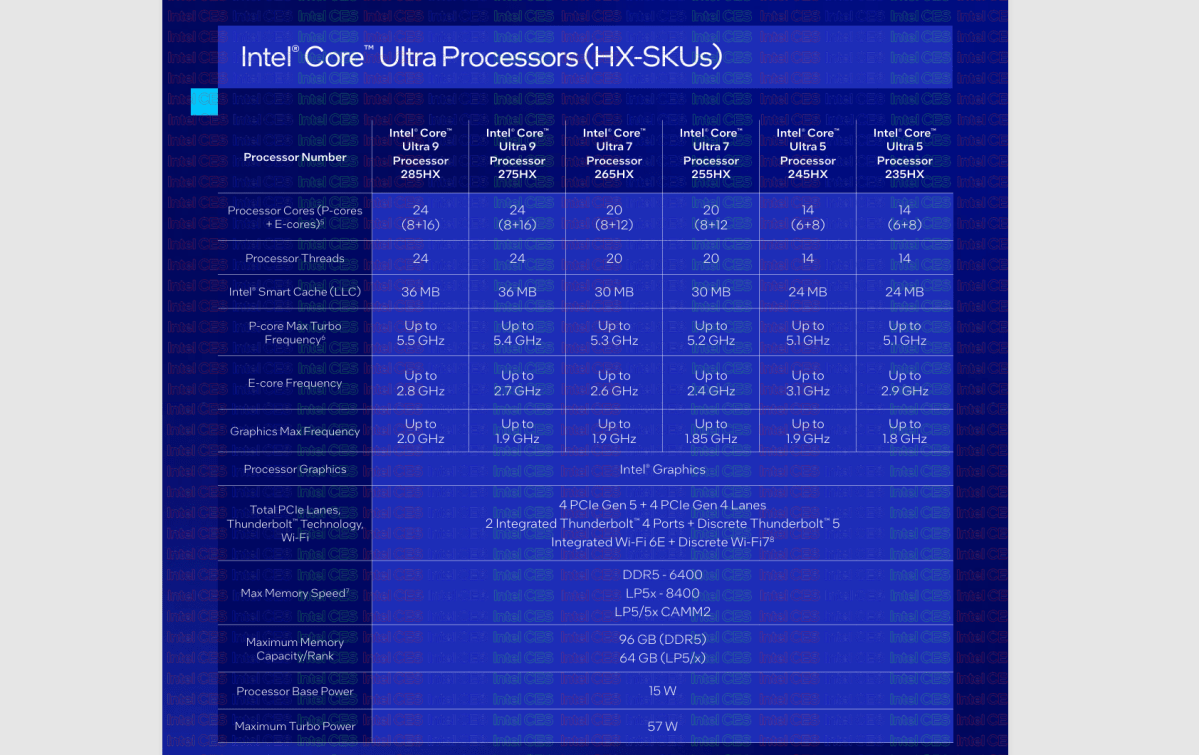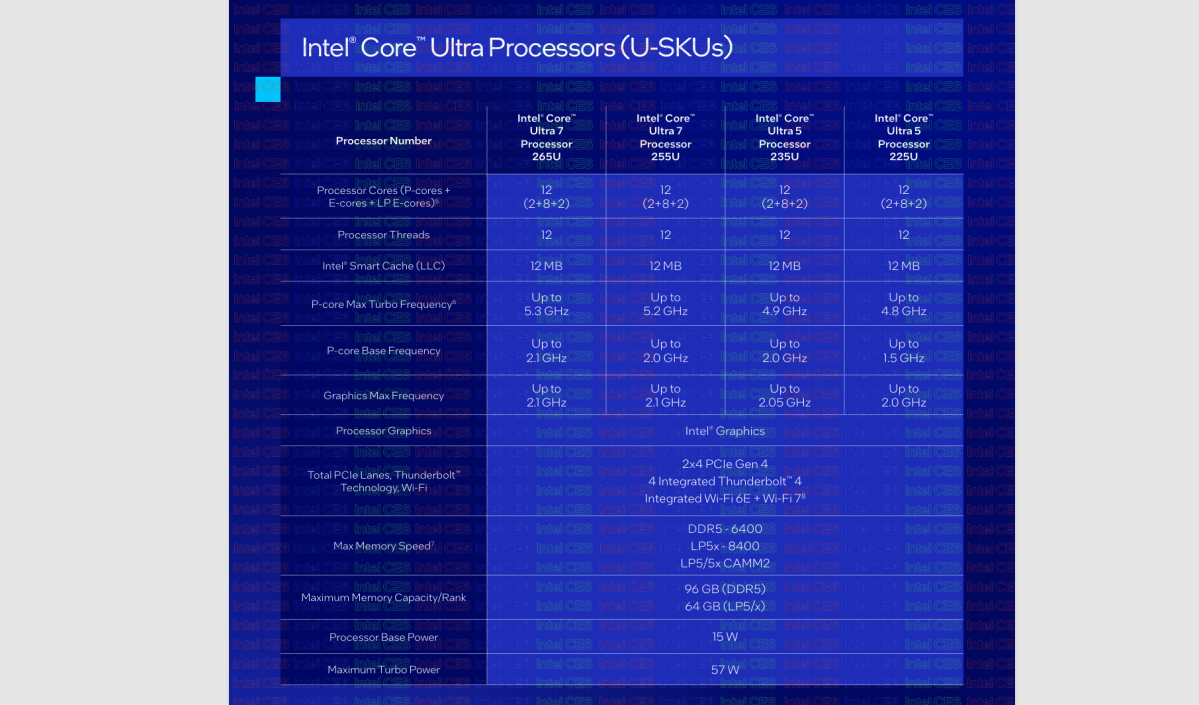After a controversial launch on the desktop, Intel is debuting its Arrow Lake processor for laptops here at CES 2025, hoping that the chip’s emphasis on low power has a more welcome reception. It’s the first time the Core Ultra branding has been rolled out for gaming laptops.
And for those who have wondered when fanless chip cooling solutions will ever debut in the real world, Intel also has some news on that front. The company confirmed that it’s working with Ventiva’s silent cooling solution as well an undisclosed laptop maker as part of Intel’s “Evo” co-engineering program with its laptop partners.
Intel unveiled new chips in three different processor families: the Core U for thin-and-light laptops; the Core H for high performance laptops; and the Core HX for similarly high performance laptops, but geared towards gaming.
One Core Ultra Series 2 family, three CPU architectures
That these latter two families are largely built around the Arrow Lake architecture isn’t unusual; Intel said to expect mobile Arrow Lake chips last year. But the Arrow Lake-U Core Ultra 2 chips are built around a refreshed version of the Meteor Lake architecture found in first-gen Core Ultra chips, complete with that architecture’s low-power efficiency cores.
This summer, Intel debuted “Lunar Lake,” the Core Ultra Series 2 processor specifically designed for long battery life, powered by its own unique architecture. As our Lunar Lake tests proved, Intel’s chip kept up with Qualcomm’s Snapdragon X processor platform quite well, both in performance and all-day battery life. AMD’s Ryzen AI 300 mobile platform, however, took the overall performance crown.
Put another way, Lunar Lake was a small step down in performance from the first Core Ultra chip, Meteor Lake. In our tests, an Asus ZenBook 14 OLED with a Core Ultra 7 155H chip inside outperformed an identical ZenBook with a Core 7 258V by 17 percent in a multithreaded test of Geekbench 6.3. The 155H outperformed Lunar Lake by about 39 percent on a single-threaded test.
Intel hopes these “Arrow Lake” Core Ultra Series 2 H-series chips can change the narrative.
Intel Core Ultra 200H, Intel’s chip for “performance” laptops
Intel is launching five new Core Ultra 200H processors, with 14 to 16 cores and threads. (These chips lack hyperthreading, too.) The Core Ultra 5 225H, the slowest of the family, runs at 4.9GHz; the fastest, the 285H, runs at 5.4GHz. The power draw ranges from 28 to 45W base power, and either 60W or 115W when in turbo mode.
Intel is saying the “next-gen” Lion Cove performance cores and Skymont efficiency cores inside this new family offer greater than 15 percent performance boosts in both single-threaded and multi-threaded performance compared to the Core Ultra 100H. It’s not clear whether they’ve received additional tuning, since Intel originally said that there was a 14 percent delta between Lion Cove and Meteor Lake’s performance core, known as Redwood Cove. These Core Ultra 200H chips do include the low-power efficiency cores of Meteor Lake, however.

Intel
They also include the updated second-gen Arc GPU that accompanied Arrow Lake, which delivers 15 percent better graphics performance than Meteor Lake, according to Intel vice president Josh Newman. Viewed from an AI perspective, that offers this latest collection of Core H chips up to 99 TOPS across the platform, including the GPU, NPU, and CPU.
Intel’s Arrow Lake desktop chip consists of compute, GPU, SOC, and I/O tiles along with a “filler” and “base” tile for stability — all linked together using Intel’s Foveros technology inside a single package. Presumably, the mobile Core Ultra 200H chips will be the same, too.
The H-series platform will offer a x8 PCI Express Gen 5 connection plus a pair of x4 PCI Express Gen 4 connections. Intel will provide four Thunderbolt 4 ports (double the typical two) and make discrete Thunderbolt 5 chips available to notebook manufacturers. Integrated Wi-Fi 6e is available, with Wi-Fi 7 as an option. Otherwise, Core Ultra 200H laptops will be able to connect to LPDDR5X-8400 memory, DDR5-6400 memory, and even LPDDR5/5X CAMM2 memory, for a total of 96GB (DDR5) and 64GB (LPDDR5).
Intel’s Core H chips will ship to customers later in the first quarter.
Intel Core Ultra 200HX: Intel’s gaming champion
Architecturally, Intel executives have said they consider the Arrow Lake-S desktop chip and the mobile Arrow Lake-HX for laptops essentially two versions of the same chip for the enthusiast PC segment — there are differences in the packaging, the power which they draw, and a few other software tweaks. Otherwise, they’re identical, Greg Boots, Arrow Lake’s product marketing manager, said at the Lunar Lake launch.

Intel
Intel isn’t saying much about the Core Ultra 200HX’s performance, but the combination of eight Lion Cove P-cores and 16 Skymont cores should boost performance by 5 percent in a single-threaded environment and 20 percent in multithreaded performance versus the previous Core-HX part, based on Intel’s 13th-gen Raptor Lake Refresh. “Enthusiast-level performance at lower power” is how Intel is putting it.
While desktop versions of Arrow Lake didn’t always ship alongside a discrete GPU, it’s much more common for a Core HX gaming notebook to include a discrete GPU. Those systems will be coming in “late Q1 2025,” Intel says, which probably means in March. You’ll have to wait until then for Intel to deliver its estimates of how well they’ll fare in gaming performance.
Intel will ship six Core HX chips, Newman said, from the Core Ultra 9 285HX (8 P cores, 16 E-Cores/24 threads, 5.5GHz) down to the Ultra 5 235HX (6 P-Cores, 8 E-Cores, 14 threads; 5.1GHz). They range from a base power of 15W on up to turbo power of 57W.
Compared to Intel’s 14th-gen Core HX parts, it’s not a clear win for Intel’s latest Core 200HX parts. The Core i9-14900HX, for example, offered the same 24 threads. That chip offered P-core turbo frequencies at up to 5.8GHz, versus the 5.5GHz on the Core Ultra 9 285HX. On the other hand, the 285HX runs the E-cores at up to 2.8GHz, significantly faster than the 2.2GHz minimum E-core speed of the i9-14900HX. (We expect more performance data soon, hopefully.)
From a platform point of view, a Core Ultra 200HX part will address the same memory configurations as the Core Ultra 200H parts — up to 64GB or 96GB of DDR5 and LPDDR5x, respectively. Intel gives laptop makers a x4 PCIe Gen 5 connection and four PCIe Gen 4 lanes, however, and only two Thunderbolt 4 ports to work with. Discrete Thunderbolt 5 is also available.
Intel is also disclosing that it will ship additional “Arrow Lake” S-series desktop products early in the first quarter, and deliver new laptops with new U-series chip for laptops, also based upon Arrow Lake.
Intel’s Arrow Lake U series fuse both Core Ultra processors
These U-series chips are interesting, as they represent an intriguing combination of Intel’s Core Ultra processors.

Intel
“The Intel Core Ultra 200U series processors utilize the Redwood Cove (P-core) architecture, which originally debuted in Intel Core Ultra Series 1 processors and Crestmont (E-core) architecture that is found throughout the Intel Core Ultra Series 2 family of processors,” an Intel spokesman said in an email. “However, the Intel Core Ultra 200U series is built on the Intel 3 process node, rather than the Intel 4 process used for Intel Core Ultra Series 1 processors, which helps improve performance of the processor overall.”
The Intel Core Ultra 200U series also features increased clock speed on the NPU, along with integrated Wi-Fi 7 and Bluetooth 5.4 connectivity, the Intel spokesman added.
Intel also plans to ship commercial versions of the Core Ultra 200V series — the products that Intel rolled out as part of Arrow Lake “shortly after CES,” Intel’s Newman said. Finally, Newman said that the company’s Evo-certified program, which co-engineers laptops and PC peripherals with the device makers themselves, has now reached 24 vendors and over 70 devices.




